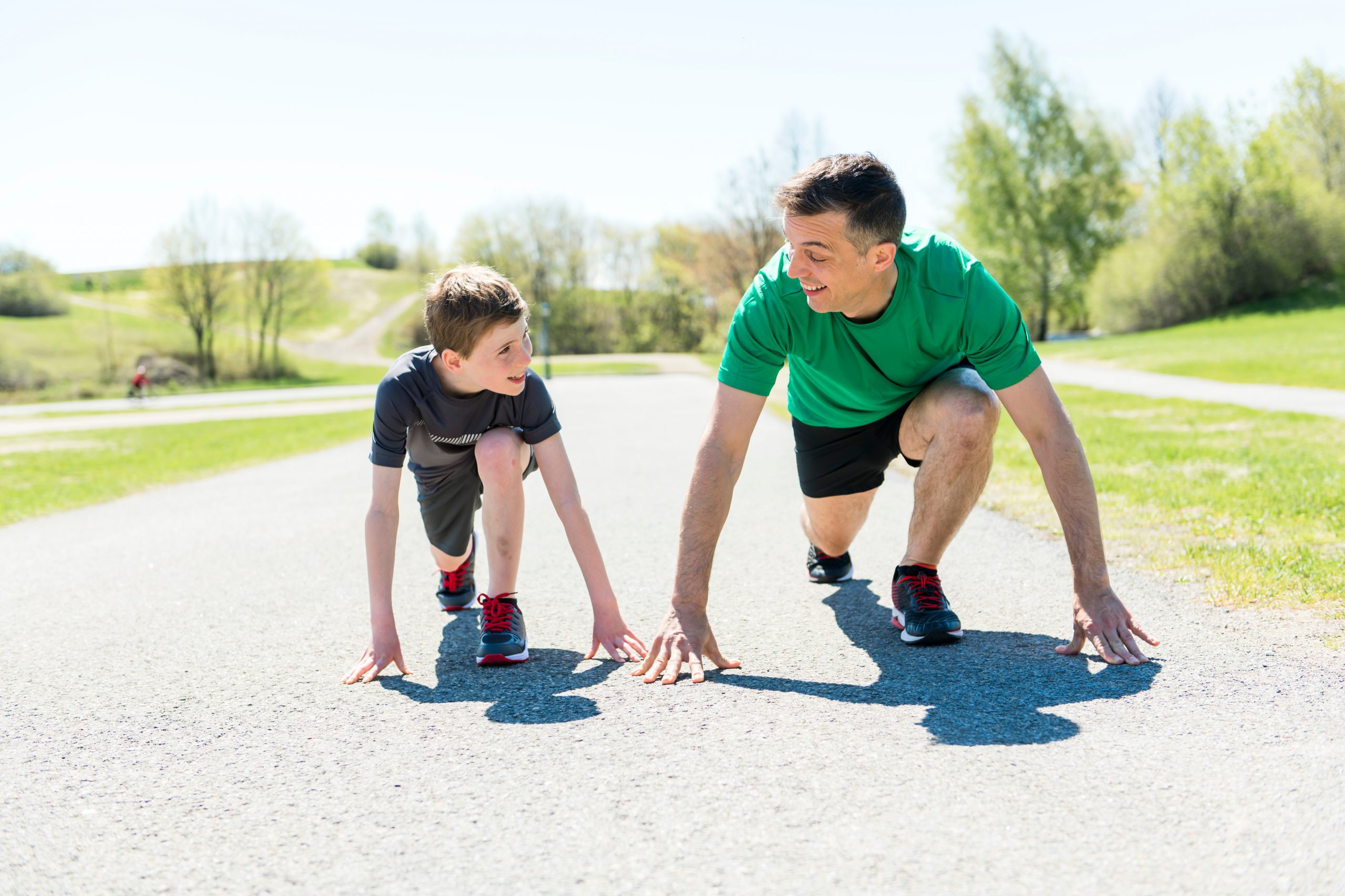Any parent knows that once your child takes their first steps, it’s only a matter of time before they’re constantly running: around the house, through the yard, and at the playground. Before long they’ll probably be begging to join you on your daily runs.
If your child starts to show interest in running, specifically long distances, follow these long distance running tips for kids.

Running Long Distances with Kids
Despite the innate ability of most children to run at will, long-distance runners need to continually train in order to get better and, more importantly, keep themselves healthy.
As a parent, you might have noticed some natural athletic abilities in your children – even at a young age. What you may not know is that you can begin developing their talents early on if you apply the right tips and techniques in a safe and healthy way.
1. Start at the Right Age

Regular exercise is certainly important for children of all ages, but consistent training and excessive exercise can interfere with a child’s physical development. Between the ages of 3 and 9, kids can enjoy running for fun. Ages 8 to 12 is an excellent range to get your child involved in some more organized running activities, like summer running program.
However, it’s not until ages 12 and 14, for girls and boys respectively, that you should really get them started on an individual training regiment.
>These ages are when you can typically expect your child to start puberty, which will see them through critical developmental changes. During these changes, you can tap into their endurance and distance learning.
2. Have the Proper Running Equipment
 A runner’s most important piece of equipment is their shoes. As your child gets older and reaches their puberty and teen years, buying running shoes becomes pretty simple. However, it can be challenging to find decent running shoes for kids under the age of 12.
A runner’s most important piece of equipment is their shoes. As your child gets older and reaches their puberty and teen years, buying running shoes becomes pretty simple. However, it can be challenging to find decent running shoes for kids under the age of 12.
Your child’s running shoes should fit properly and offer excellent support to avoid injuries such as shin splints or joint problems. Additionally, buying your kids the right kind of socks can help prevent blisters.
While you shouldn’t sacrifice health and safety for cost, remember that your young child is continually growing. You should get them quality running shoes, but don’t break the bank on equipment that will only last one season.
3. Start Small & Increase Distance Slowly

Every sport and physical activity takes time and practice to develop, whether you’re talking about running, football, or weight lifting. The best way to improve your skills is to start where you’re at and slowly increase difficulty.
For running, in particular, your child’s training will include distance, speed, and frequency. You should never expect too much from your child right away. Start with short distances, lower intensities, and limited frequency.
As the training progresses, you can evaluate your child’s performance, improvements, and abilities to gradually increase distances and eventually work on speed.
4. Stay Consistent
Consistency is the key to learning any new skill. If you want to be the best at something, you have to keep practicing. Even those with natural athletic ability need to continually practice if they’re going to reach their full potential.
Consistency can be difficult for young children, so do your best to keep them on track. This might look like sitting down with them and writing out a simple training schedule. Mark the training days on a calendar and have your child cross them off when they’ve completed them.
For younger children, you might even offer some sort of reward system to help encourage good habits. Make training days special bonding days to help them stand out and make your kid want to complete them.
5. Stay Hydrated
Staying adequately hydrated is important for anyone’s health, but it becomes even more critical when you are an athlete. The dangers of dehydration are very real. On average, children ages eight and older should drink about 64 ounces of water per day.
Additionally, experts say that you need to consume even more water during exercise. Doing so can help regulate body temperature, prevent cramps and injury, and help you perform better.
Help your child stay hydrated during training and throughout the day. Purchase a special water bottle for them that measures their water on the outside. You can make it fun by letting them choose the color or design.
Always explain the importance of drinking water to your child, especially during long-distance running training. You can lead by example by meeting your water goals alongside them. If you’re having trouble getting your child to drink water, try adding flavors or swapping out some servings for healthy sports drinks.
6. Emphasize the Importance of Warm-Ups & Stretching

Children are very impulsive, so when you say it’s time to run, they very well may hop up and start running. Take the time to relay to them the importance of warm-ups and stretching to them.
Warming up your body and stretching out before a run can minimize the risk of injury and prepare your muscles for the workout ahead. If you teach your kids this at a young age, it will become second nature. They will soon automatically begin stretching before each training session, and that’s a wonderful habit for a long-distance runner to have.
7. Be a Good Coach
When you start long distance training at a young age, you are your child’s very first coach. They may fall under the leadership of a team or school coach one day, but for now, they’re looking up to you to give them good instruction.
The best thing you can do to enhance your child’s running is to be a good coach. Do your research and learn helpful techniques. Encourage them to do their best and practice positive criticism.
Most of all, always believe in them. There will be hard days for both of you: days when your child wants to quit and days when you don’t feel like going for that run. At this moment, your opinion and leadership mean everything, so you must be a good, reliable coach.


